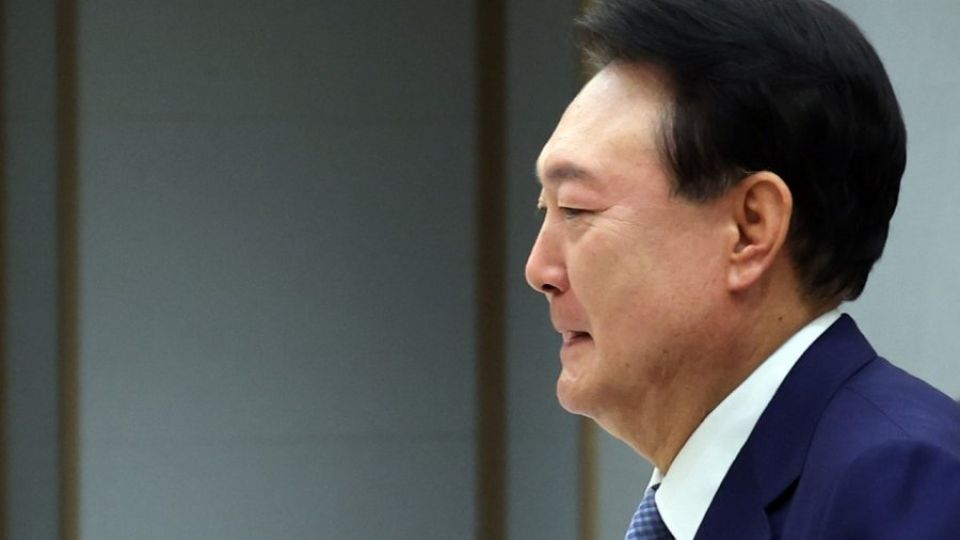September 3, 2024
SEOUL – President Yoon Suk Yeol’s job approval rating has sunk to its lowest depths in about two years, amid a lingering standoff between medical circles and the government that has sapped public trust in his medical reform push.
According to South Korean pollster Realmeter on Monday, Yoon’s job approval rating dropped to 29.6 percent in the fifth week of August, down 0.4 percentage point from the previous week. It was the lowest since his rating marked 29.3 percent in the first week of August 2022.
According to Realmeter, the government’s medical reform initiative — aimed at adding more doctors in the country by raising the medical school enrollment quota and encouraging many of them to work in critical health care sectors — is a situation in which “the government no longer has the public’s support” even after Yoon’s news conference on Thursday, as a significant staffing shortage in emergency rooms across the country amid the mass walkout of medical interns and residents since February “has become a reality.”
A separate poll conducted by Gallup Korea showed Friday that Yoon’s support stood at 23 percent in the fifth week of August, down 5 percentage points from a month earlier. His rating was the lowest in three months, since the final week of May when his popularity was at 21 percent.
As Yoon and his administration played down the medical crisis, Rep. Lee Jae-myung, chair of the main opposition Democratic Party of Korea, said in a meeting with physicians Monday that the government’s aggressive push for medical reform “has brought Korea’s medical system to the brink of collapse.”
News reports about numerous patients in states of medical emergency failing to get admitted to hospitals have been making headlines here. Among the victims are veteran politician Kim Chong-in, who was reportedly turned down by 22 emergency rooms after a fall, and Democratic Party lawmaker Rep. Kim Han-kyu, whose now-late father collapsed and was unable to get admitted to an emergency room for urgent surgery until 12 hours later, after which he eventually died. Also, a video revealed by the Democratic Party showed Friday multiple emergency rooms rejecting a patient who had suffered a stroke, with the ambulance driving back and forth between short-staffed hospitals.
The Yoon administration has remained adamant in its reform push, despite calls that it reconsider the plan set on a radical increase in the medical school quota.
Leaders of both parties have pointed to the Yoon administration’s stance as the cause of the medical standoff and understaffed emergency rooms. In contrast, the presidential office has blamed patients with “light symptoms” for rushing to emergency rooms instead of visiting neighborhood clinics.
Asked whether the cumulative exhaustion of medical workers could be reaching a breaking point, while the government keeps saying that it is managing everything fine, on Thursday, Yoon responded at a news conference, “You are bringing up the arguments of those who oppose the medical school quota hike plan. I think you should go visit hospitals to see how the medical service is being provided, especially in remote regions.”
Yoon continued, “We do have many problems, but the emergency medical system is still operating smoothly. The government is doing our best … (the medical staff shortage) is the reason why we should push the medical reform, not the reason why we should stop it.”
Yoon has repeatedly claimed that increasing the nationwide annual medical school quota from 3,058 to 5,058 is a prerequisite for other medical reforms, such as the increase in monetary compensation from both patients and the National Health Insurance Service for those working in the fields of the essential health care sector.
Roughly 10,000 medical interns and residents have walked out of their respective teaching hospitals in protest against the government’s plan since February, out of the total of approximately 13,000. The country has some 140,000 doctors.
The government has already confirmed plans to admit 4,567 medical school students for 2025, in the first admissions quota hike in 27 years.
Park Min-soo, second vice minister of the Health Ministry, said in a briefing Monday that South Korea is “not in a situation to worry about a medical meltdown,” and promised to hold daily briefings about the state of the country’s emergency room operations.
According to Park, 406 of 409 emergency medical centers operate 24 hours a day, while 97.5 percent of the hospital beds in such centers were available as of the end of August. He also said emergency medical centers are understaffed by 26.6 percent.
Amid the medical system crisis, attacks of the unpopular president from the Democratic Party are intensifying, including raising suspicions the Yoon administration is preparing to declare martial law.
Rep. Cheon Jun-ho of the Democratic Party on Monday reiterated party leader Lee’s allegation that Yoon seems to be preparing to transition to military rule during his meeting with his ruling party counterpart Sunday. Cheon said the Yoon administration “is highly likely to be (secretly) preparing to declare martial law.”
Han Dong-hoon, chair of the People Power Party, responded Monday that the main opposition party is making “irresponsible” martial law claims, saying the party would be committing “a public incitement” if it fails to present the grounds for its claims.


